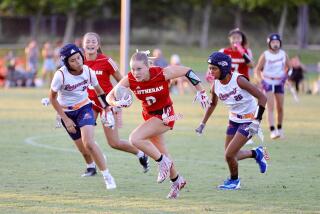Essayists Endorse Grades for Teachers
Ventura County teens would like the chance to rate the performance of teachers, but wonder if anyone would listen to them--and worry some students would abuse the privilege.
In the latest essay contest sponsored by the Ventura County Edition of The Times, high school students resoundingly endorsed the idea of teacher evaluations similar to the written report cards college students commonly fill out at the end of each academic term.
âI think that a system of teacher evaluations by students could be helpful because not all teachers are perfect, and this could be the only way to alert school administrators to any problems,â wrote contest winner Gary Wallace, a sophomore at Moorpark High School.
But, he noted, âIf students are willing to express their anger by shooting a teacher, such students might be willing to vindictively damage a teacherâs reputation through a written evaluation.â
Wallaceâs essay, which earns him $100, will be published Sunday on the Ventura County Edition editorial page and will be posted on The Timesâ World Wide Web site at http://ukobiw.net./essaycorner.
No essay topic is being announced for June, as the contest--along with students and their teachers--goes on vacation.
Students participating in the latest contest were asked to address this question: Would a system of formal evaluations of teachers by students help improve the quality of a high school education, or would it be harmful?
Not all agreed that evaluations are a good idea. One student called them pointless.
âIt does nothing to improve your education, except perhaps for the length of a week or two,â wrote Betsy Brewer, a senior at La Reina High School in Thousand Oaks. âTeacher evaluations do not work, have rarely succeeded, and are a waste of time.â
Opening Lines of Communication
But most student essayists argued that student evaluations serve the interests of teachers and students both.
âTeaching requires a lot of work and sometimes the teacher is unable to realize what they are doing wrong,â wrote Lindsay Roberts. âStudents canât talk to them about it during class.â
Beki Hill, a 16-year-old La Reina student, agreed. âMany parents advise their children to go talk to a teacher if they do not agree with their teaching habits; however, this is very intimidating and often students feel the teacher will be mad that the student has a problem with their teaching.â
âWith the assistance from student evaluations, a teacher will get a better feeling for [the] value of their daily lessons,â wrote Courtney Lynn Miller, a senior at Westlake High.
Students are better able to gauge the effectiveness of a teacher than any adult observer or visitor, many wrote.
âNo one has a better perspective on the teachers in a school than the students,â wrote Susan Esparza, a junior at La Reina. âA student is, by definition, the only one who has the opportunity to observe the effectiveness of an instructorâs style. Observers in the class are only observing, not learning, and therefore do not have the first-hand experience gained by a student.â
âTeachers need to be evaluated by their students because the students are the ones who can really judge and determine the performance of a teacher,â wrote Jessica Albarran, also a junior at La Reina.
âStudents who are in the classroom with a teacher 45 minutes a day, five days a week, have a fairly good idea of that teacherâs ability to teach,â she wrote. âLike in any other business, the consumer of the product is the best one to judge the quality of the product.â
Spot checks by school administrators are not as effective in measuring teacher performance, Albarran wrote.
âThe teacher could have been having a horrible day, or could have been putting on a false front, acting differently (consciously or unconsciously) because the evaluator was present,â she wrote.
âA teacher who appears to be good with students when visitors are around might be rude or cruel or lewd and the only people in a position to tell anyone are the students,â agreed Esparza of La Reina High.
Students filling out anonymous, written evaluations would be more inclined to give honest opinions, wrote La Reina sophomore Emily Cohen.
And âA way to eliminate teacher bashing or personal dislikes coming through in student evaluations is to ask the students to evaluate the teaching methods . . . rather than the individual teacher,â she wrote.
Evaluations as Weapons
Many students, however, raised concerns about how regular evaluations could be misused.
âSome students might mark all teachers as âpoorâ just because they think it is funny,â wrote contest winner Wallace of Moorpark High. âOthers might randomly fill in answers without thoroughly understanding the questions.â
Some students also may give teachers poor evaluations only because they are teaching a difficult subject, Wallace wrote.
âIf students feel that the amount of work is excessive, they tend to blame the teacher, not the system. What many students do not realize is that it is the teacherâs job to prepare all pupils for the next grade level.â
Those risks are worth taking, many essayists concluded.
âGranted, some comments may be immature or irrelevant, but many students care about their education and will take the time to provide honest opinions and helpful suggestions,â wrote Susan Tam, a freshman at Westlake High School.
Christiana King, a sophomore at Santa Susana High School in Simi Valley, recalled a teacher who had students gather in a circle to tell her what they thought of her teaching.
âThe students responded with pros and cons of her teaching style,â King wrote. âWith the information taken from her students, she altered her teaching style to their liking yet she still had a little of her own technique in it. I thought her to be very smart in asking us what our opinion was.â
More to Read
Sign up for Essential California
The most important California stories and recommendations in your inbox every morning.
You may occasionally receive promotional content from the Los Angeles Times.










